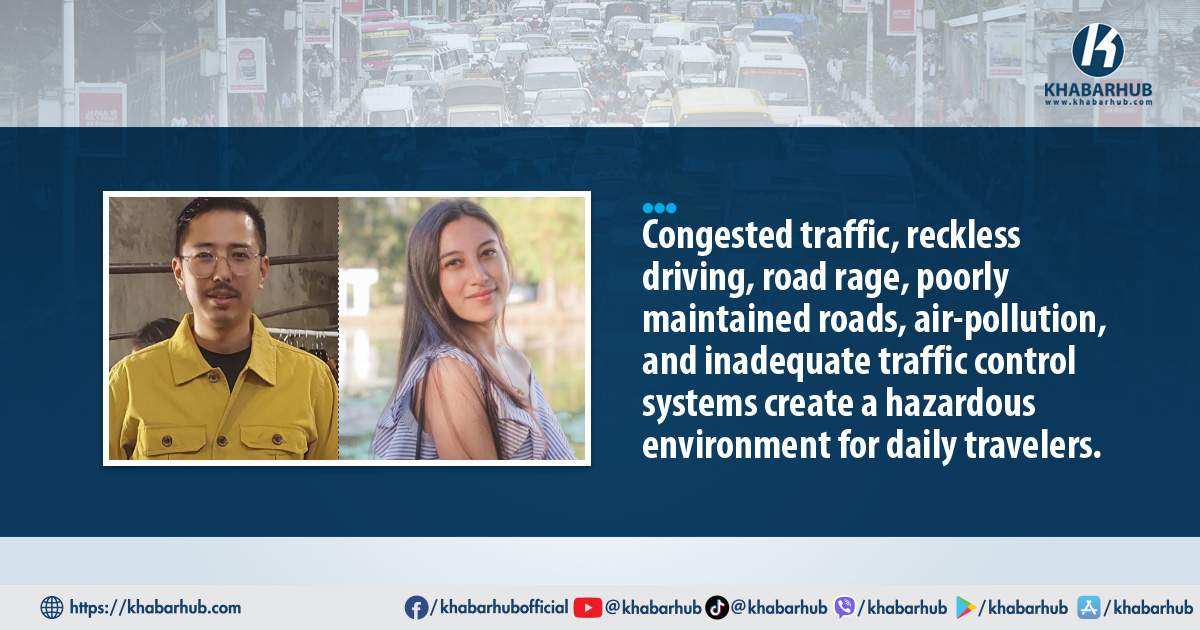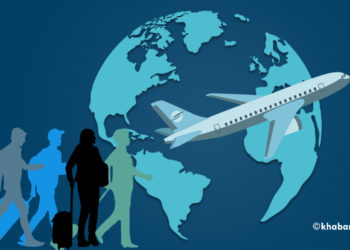KATHMANDU: The headlines given below tell a grim story of Nepal’s roads.
“Four killed, six injured in a road accident in Chitwan” (Nov. 8, 2024)
“Traffic police under scrutiny after tragic accident in Bhaktapur claims a life” (April 15, 2024)
“252 road accident-related deaths in just the month of Mangsir” (Dec. 20, 2024)
“Over 1,200 deaths in road accidents in the last six months” (Feb. 18, 2025)
“A cyclist hit by Sajha bus in Jamal, Kathmandu, dies” (Feb. 18, 2025)
These tragic headlines have become all too familiar in the media, reflecting the daily battle commuters face on Nepal’s roads.
Congested traffic, reckless driving, road rage, poorly maintained roads, air-pollution, and inadequate traffic control systems create a hazardous environment for daily travelers.
The pressing need for improvements to road safety and traffic management is undeniable, as the country continues to grapple with its road-related challenges.
Despite the efforts by Nepal Traffic Police regarding traffic awareness and penalties, the problems only seems to be growing.
Public transport such as busses and microbusses are always racing each other for more passenges, endangering lives. Youths on motorbikes speeding recklessly and posting on social media are creating a negative influence to other youths.
Besides these issues, the mental toll of congested traffic, pollution and road rage are underlooked issues which city dwellers are facing in everyday commute.
Awareness programs come second. Just like physical training, history lessons, or social studies, traffic discipline must be an integral part of the school curriculum.
And regarding pedestrians, there are no organized-spacious-foothpaths for those who commute on foot, increasing the risk of road mishaps.
A cultural shift toward traffic discipline
Roads are common spaces to which everyone has an equal right to access and use them safely and effectively.
Putting aside corruption, a collective lack of discipline creates a crisis in commuting.
A cultural shift towards creating traffic discipline should start with integrating knowledge into the education system.
Awareness programs come second. Just like physical training, history lessons, or social studies, traffic discipline must be an integral part of the school curriculum.
This would include lane discipline, traffic signals, using footpaths, and other basics of commuting ethics.
Early education can instill a lifelong awareness of road safety and respect for others’ right to use the roads. This can create a future generation that values safe and disciplined commuting.
Government oversight for public transport
Public transport in Nepal is dominated by private operators. This creates competition among vehicles to pick up more passengers, leading to hazardous races on public roads.
This “culture” of racing to pick up more passengers endangers the lives of pedestrians, bikers, and even passengers.
Solution? Government regulation. The number and flow of passengers are constant, varying only by time and location.
The main concern of public transport should be service and a strictly non-profit motive.
Public transport should focus on coordinated movement with respect to timetables, safe pick-up and drop-off services at designated stops, and not exceeding the limited carrying capacity.
Even if passengers miss their vehicle due to the mentioned limitations, there is always another one arriving within a few minutes.
The transport company will eventually collect the same revenue. What’s the point in rushing?
A structured system of government-operated or heavily regulated public transport can bring accountability to the roads.
Monitoring reckless driving among youths
Mounting a camera on a helmet, speeding over 100 km/h, racing, and performing stunts on public roads while sharing them on social media has become all too “cool” among youngsters.
Nepal’s roads are a daily battleground for commuters. Addressing the crisis requires a multi-pronged approach: instilling traffic discipline from an early age, regulating public transport, and tackling reckless behavior among youths.
This behavior has not only endangered the lives of the youngsters and other innocent commuters but has also influenced other youths to follow the same.
Traffic police should not only monitor such behaviors on the road but also in social media and penalize accordingly. Otherwise, this will only increase reckless driving among youths in the coming days.
Commuter struggles and experience – vulnerable groups
Nepal’s public transportation system faces significant challenges, particularly for vulnerable groups such as people with disabilities, the elderly, pregnant women, and parents with small children.
These issues stem from inadequate infrastructure, inconsistent policy enforcement, and a lack of empathy among transport operators and passengers.
Despite existing legal provisions, public transport fails to ensure safety, dignity, and accessibility for all, leaving many to endure daily struggles.
People with disabilities face some of the most severe difficulties. Section 107 of the Vehicles and Transport Act, 1993 mandates reserved seats for those with disabilities, women, and the elderly.
However, public vehicles are often found violating the rule. Transport operators frequently neglect these provisions, leaving passengers with disabilities to navigate a system that is neither designed nor operated with their needs in mind.
Many commuters report being denied fare discounts, treated disrespectfully, or left at the wrong locations without assistance.
While initiatives such as low-floor electric buses have been introduced, their impact is limited due to poor urban planning and a lack of disability-friendly infrastructure.
Bus stops lack ramps and accessible design, making it challenging for those with mobility constraints.
Other vulnerable groups such as elderly passengers, pregnant women, parents traveling with small children, and people with temporary impairments also often struggle with overcrowding, boarding high-floor vehicles, and enduring unsafe and uncomfortable conditions due to the absence of priority seating or designated spaces.
Additionally, unpredictable public transport schedules leave vulnerable passengers in constant uncertainty.
Furthermore, the needs of vulnerable groups are often neglected and are not inclusive due to weak implementation of seat reservations, economic barriers, and lack of empathy, which worsen these issues, leaving passengers to navigate an unfair and inaccessible system.
To address these issues, Nepal must prioritize inclusive infrastructure development and effective policy enforcement.
Public vehicles must be designed with accessibility in mind, including features such as low floors, ramps, and guides.
Bus stops should be upgraded to ensure safe and dignified access for all passengers.
Policies reserving seats and offering fare discounts must be enforced strictly, with penalties for violations of these rules.
Additionally, public awareness campaigns and training programs for transport operators can encourage empathy and understanding, ensuring that the needs of vulnerable groups are respected.
A call for change
Nepal’s roads are a daily battleground for commuters. Addressing the crisis requires a multi-pronged approach: instilling traffic discipline from an early age, regulating public transport, and tackling reckless behavior among youths.
Traffic police, government bodies, and the public must work together to create safer roads.
Roads are not just means of commuting; they are lifelines connecting lives and livelihoods. It is time to prioritize safety, discipline, and accountability to make commuting in Nepal less of a struggle and more of a shared responsibility.









Comment